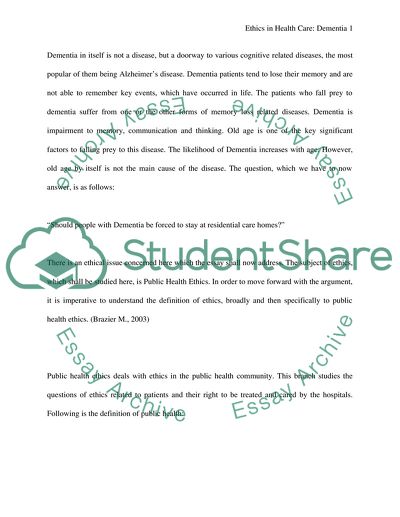Cite this document
(“SHOULD PEOPLE WITH DEMENTIA BE COMPULSORY TO GO TO RESIDENTIAL CARE Essay - 1”, n.d.)
SHOULD PEOPLE WITH DEMENTIA BE COMPULSORY TO GO TO RESIDENTIAL CARE Essay - 1. Retrieved from https://studentshare.org/health-sciences-medicine/1624517-should-people-with-dementia-be-compulsory-to-go-to-residential-care-home-or-stay-in-their-homesidentify-and-critically-evaluate-ethical-and-legal-issues-related-to-health-care-demonstrate-understanding-of-ethical-and-legal-viewpoints-arguments
SHOULD PEOPLE WITH DEMENTIA BE COMPULSORY TO GO TO RESIDENTIAL CARE Essay - 1. Retrieved from https://studentshare.org/health-sciences-medicine/1624517-should-people-with-dementia-be-compulsory-to-go-to-residential-care-home-or-stay-in-their-homesidentify-and-critically-evaluate-ethical-and-legal-issues-related-to-health-care-demonstrate-understanding-of-ethical-and-legal-viewpoints-arguments
(SHOULD PEOPLE WITH DEMENTIA BE COMPULSORY TO GO TO RESIDENTIAL CARE Essay - 1)
SHOULD PEOPLE WITH DEMENTIA BE COMPULSORY TO GO TO RESIDENTIAL CARE Essay - 1. https://studentshare.org/health-sciences-medicine/1624517-should-people-with-dementia-be-compulsory-to-go-to-residential-care-home-or-stay-in-their-homesidentify-and-critically-evaluate-ethical-and-legal-issues-related-to-health-care-demonstrate-understanding-of-ethical-and-legal-viewpoints-arguments.
SHOULD PEOPLE WITH DEMENTIA BE COMPULSORY TO GO TO RESIDENTIAL CARE Essay - 1. https://studentshare.org/health-sciences-medicine/1624517-should-people-with-dementia-be-compulsory-to-go-to-residential-care-home-or-stay-in-their-homesidentify-and-critically-evaluate-ethical-and-legal-issues-related-to-health-care-demonstrate-understanding-of-ethical-and-legal-viewpoints-arguments.
“SHOULD PEOPLE WITH DEMENTIA BE COMPULSORY TO GO TO RESIDENTIAL CARE Essay - 1”, n.d. https://studentshare.org/health-sciences-medicine/1624517-should-people-with-dementia-be-compulsory-to-go-to-residential-care-home-or-stay-in-their-homesidentify-and-critically-evaluate-ethical-and-legal-issues-related-to-health-care-demonstrate-understanding-of-ethical-and-legal-viewpoints-arguments.


